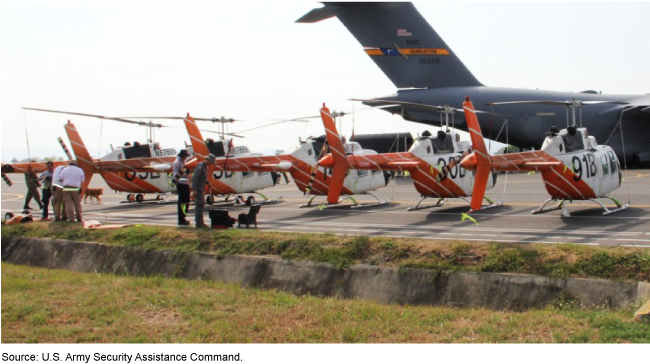Building Partner Capacity: DOD Should Assess Delivery Delays in Train and Equip Projects and Improve Evaluations
Fast Facts
In FYs 2018-2022, the Department of Defense allocated more than $5 billion to improve partner countries' ability to address threats like terrorism and drug trafficking. These projects provided equipment, training, services, and construction to national security forces.
But 75% of the projects' deliverables were delayed, limiting the projects' success. Also, DOD evaluations of projects' effectiveness were not high quality—for instance, evidence and findings weren't clearly linked to conclusions.
We recommended that DOD systematically identify and analyze the factors contributing to delivery delays and improve its project evaluations.
Helicopters provided by DOD to the Regional Helicopter Training Center in Melgar, Colombia.

Highlights
What GAO Found
In fiscal years (FY) 2018 through 2022, the Department of Defense (DOD) allocated nearly $5.6 billion through Section 333—one of its largest security cooperation programs—to build the capacity of partner nations' national security forces to conduct certain operations. This funding supported projects intended to provide equipment, training, services, and construction activities to the security forces of at least 90 partner nations to address threats such as terrorism and narcotics trafficking. DOD allocated nearly 16 percent of this funding to projects in Lebanon and Jordan. In FYs 2019 through 2022, 77 percent of allocations supported projects related to maritime and border security operations and counterterrorism operations.
Examples of Assistance DOD Has Provided to Partner Nations through Section 333

DOD delivered most Section 333 project activities after the estimated dates but does not monitor aggregate timeliness and has not analyzed the causes of delays. GAO's analysis of DOD data found that as of the end of FY 2022, 75 percent of deliveries were delayed relative to DOD's estimated dates. DOD monitors individual deliveries' timeliness but has not established a performance measure, such as a targeted percentage, that would let it regularly assess aggregate timeliness. Also, DOD has not systematically identified and analyzed factors contributing to delivery delays. Setting a performance measure for aggregate timeliness and systematically analyzing factors causing delays would help DOD ensure effective corrective measures.
DOD's evaluations of six Section 333 projects it completed in FYs 2017 through 2022 showed mixed results, but these evaluations were not high quality. DOD evaluations showed that four of the six projects improved the capabilities of partner nations' security forces and two projects did not because of unsuitable or unreliable equipment. However, GAO's analysis of the extent to which the evaluations met criteria for quality found weaknesses in their design, implementation, and conclusions. For example, the basis of the evaluations' conclusions was generally unclear, because the evaluations did not explain how evidence had been collected or summarized. Improving the quality of Section 333 project evaluations would help DOD to understand whether its projects were effective and to apply lessons learned from the evaluations to the development of new projects.
Why GAO Did This Study
DOD uses security cooperation programs, including those authorized by Section 333 of title 10 of the U.S. Code, to build the capacity and capability of partner nations to address various global threats. DOD is required to report to Congress on the status of its Section 333 projects and to evaluate the efficiency and effectiveness of its security cooperation programs.
The FY 2022 National Defense Authorization Act includes a provision for GAO to review Section 333 assistance. This report examines (1) DOD's allocation of funding for Section 333 assistance in FYs 2018 through 2022, (2) the extent to which DOD delivered Section 333 assistance to partner nations as scheduled, and (3) the findings of DOD evaluations of Section 333 projects as well as the extent to which the evaluations met criteria for evaluation quality.
GAO analyzed DOD data for Section 333 projects, reviewed DOD evaluation policies and other relevant documents, and compared six Section 333 project evaluations to criteria for quality. GAO also interviewed DOD officials and contractors.
Recommendations
GAO is making four recommendations to DOD to improve the timeliness of its Section 333 project deliveries and the quality of its project evaluations. DOD agreed with GAO's recommendations.
Recommendations for Executive Action
| Agency Affected | Recommendation | Status |
|---|---|---|
| Department of Defense | 1. The Secretary of Defense should ensure that the Director of DSCA establishes a performance measure, such as a targeted percentage for on-time deliveries for Section 333 projects, that will allow it to regularly assess and monitor the aggregate timeliness of deliveries for Section 333 projects. (Recommendation 1) |
When we confirm what actions the agency has taken in response to this recommendation, we will provide updated information.
|
| Department of Defense | 2. The Secretary of Defense should ensure that the Director of DSCA works with implementing agencies to systematically identify and analyze factors contributing to delivery delays for Section 333 projects. (Recommendation 2) |
When we confirm what actions the agency has taken in response to this recommendation, we will provide updated information.
|
| Department of Defense | 3. The Secretary of Defense should ensure that the Director of DSCA, in coordination with implementing agencies and other stakeholders, uses the results of its analysis of factors contributing to Section 333 delivery delays to develop an action plan to mitigate or prevent potential future delays. (Recommendation 3) |
When we confirm what actions the agency has taken in response to this recommendation, we will provide updated information.
|
| Department of Defense | 4. The Secretary of Defense should ensure that the Director of DSCA takes steps to improve the quality of Section 333 project evaluations to better align with international best practices, such as by including the reporting elements specified by the agency's evaluation instructions. (Recommendation 4) |
When we confirm what actions the agency has taken in response to this recommendation, we will provide updated information.
|
